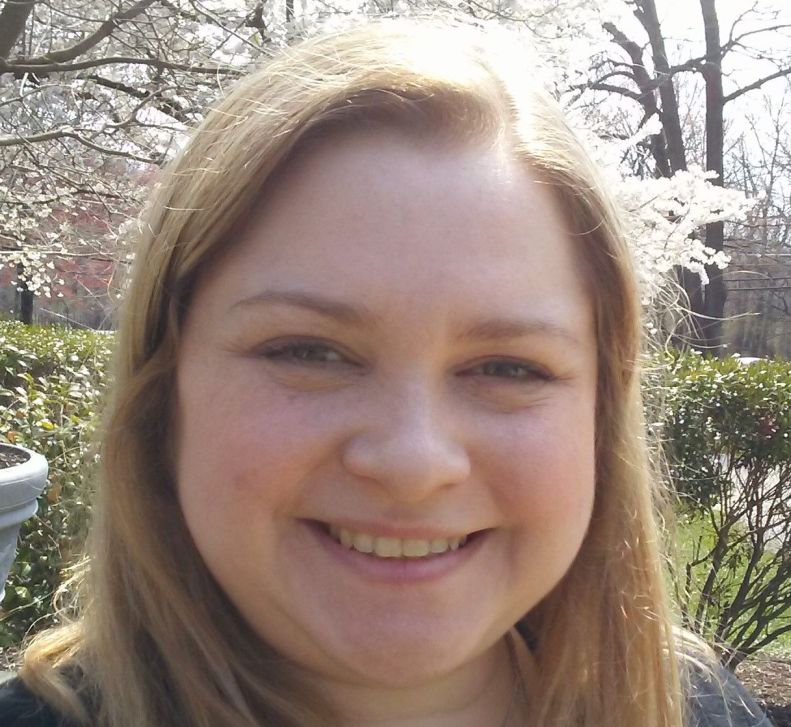
In her role as a digital media specialist for the USCCB, Connie Poulos manages the day-to-day activity of the Conference’s Facebook, Twitter, and Instagram accounts. In addition, she helps to create and execute marketing strategies through social media and email, in order to promote both the image of the organization and the sales of its publications. She explains: “Because of its high profile, managing social media for the USCCB involves monitoring hundreds of emotionally-charged comments throughout the week, as well as knowing when and how to respond. I also help to monitor current events, both in the Catholic world and otherwise, in order to help inform the broader communications team of situations that may require a response or a statement from the bishops.”
Connie graduated from Catholic University in 2009, at the height of the recession. She says, “Getting one’s dream job is almost never an immediate process, and for me this was no different. I knew that I wanted to be a writer, but I didn’t know what kind. Initially, I was able to use my writing skills to do freelance marketing copy for a small web development company, but this was only part-time. Full-time gigs at that time were extremely competitive, much more than they are now. So, in order to make a real salary, I took an administrative assistant position with an autobody shop. I like cars enough that it wasn’t horrible, and I learned a lot of workplace and customer service skills in my three years there. From there I became a front desk person at a small advertising agency. My day-to-day was pretty brutal, with routine administrative tasks that really didn’t fit my talents, personality, or education, but I had a benevolent colleague there who let me try my hand at writing a few press releases for high-profile clients. I really didn’t like administrative work, but from being in that environment and meeting marketing professionals, I discovered that I wanted to be a marketing writer.
“After almost two years there, some of my colleagues helped me clean up my resume and market myself for a position as a copywriter. I landed a job at Network for Good, an amazing company in downtown D.C. that creates and sells fundraising software for growing nonprofits. I really loved that job. For two years, I spent my days writing blog posts, sales emails, social media posts, e-books, landing pages, and Google ads. I thought I had ‘made it’ then, and I had no intentions of leaving.
“Still though, you always have your ultimate dream jobs in the back of your mind, right? From the time I was a kid I wanted to work for the Church. I had fantasies of working at the Vatican, but being an expat wasn’t really appealing to me, so the USCCB was my top choice. One weekend last September, by the grace of God I was browsing the USCCB website and noticed the opening for a digital media specialist in the marketing department. I applied. I got the job. I said yes, and I haven’t looked back. And, as a side note, that old fantasy about working at the Vatican is actually coming true: I’m being sent to Rome for the month of October to cover the upcoming Synod via social media.”
Connie’s job involves researching, analyzing, and synthesizing information from sources such as news outlets, church documents, and bishops’ statements, and presenting this in a way that makes people stop and listen. She says, “Really, all marketing is this – understanding the product and how to make people interested – but with the USCCB it’s even bigger.” It turns out that there is an unusually direct connection between Connie’s history studies at Catholic University and her present work. “My thesis explored the issues between Italian immigrants and Catholic parishes in Washington, D.C. in the early 20th century. Much of the current subject matter on our social media has to do with the bishops’ response to immigration issues, so having a grounding of the history of the Church’s response to this has helped me in my creation of content to promote the bishops’ message (which, just as in the early 20th century, was one of inclusion and integration). I helped to create a series of videos promoting the bishop’s stance on various segments of the immigration puzzle and was able to tie it back on an emotional level to previous immigration waves.”
Looking back, Connie says that one of the things she most valued about majoring in history was the opportunity it gave her to study things she’d never encountered before, and to combine new information with learning ways to asssimilate it. “This has really had an impact on me in my life as I learn about current events and topics. I loved that I was encouraged to explore and think for myself. As a history major, you learn never to sit back and accept the narrative they’re trying to sell you without first looking at all the angles. This is something that I’ve kept with me to this day.”
